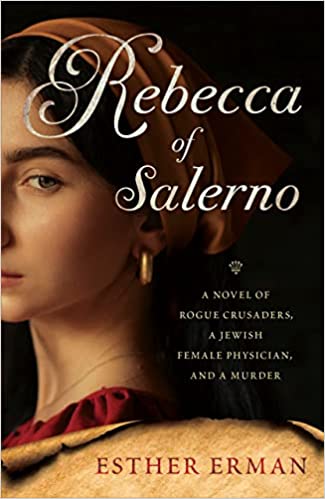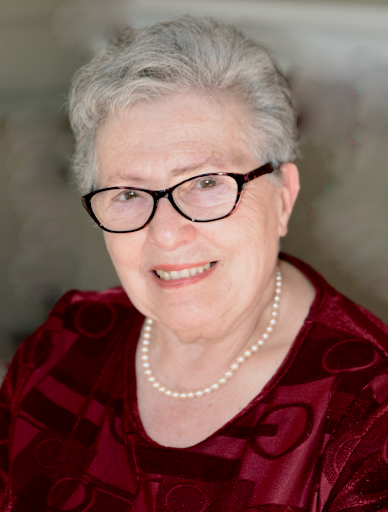 Historical mystery picks up where Ivanhoe left off 200 years ago
Historical mystery picks up where Ivanhoe left off 200 years ago
MOUNTAIN VIEW, CA – Jewish author Esther Erman has blended historical romance and mystery in her new novel, Rebecca of Salerno: A Novel of Rogue Crusaders, a Jewish Female Physician, and a Murder (She Writes Press, August 2, 2022). Inspired by the 1820 novel Ivanhoe, Erman highlights adventure and female empowerment with the beautiful, brilliant and brave jewish woman Rebecca, who, after falling deeply in love with a man she couldn’t marry, vowed to stay single and have a career as a healer. At the time, none of this was normal for a jewish woman.
“From what you say, I see no reason for you to refuse to marry Rafael. But perhaps it is that you have no feelings for him?”
Broken-hearted after fleeing England and her ill-fated love for the Christian knight Ivanhoe, Rebecca discovers the medical school in Salerno, where Jews, Christians, and Moslems—men and women—can study together. Still in thrall to Ivanhoe, she resists traditional and societal demands on women to wed and bear children, instead building her life as a physician. But the dawn of the thirteenth century brought political changes that threatened the security of Jewish life in the Kingdom of Sicily. When a rabbi is falsely accused of murdering a crusader, Rebecca and Rafael, the man who loves her, throw themselves into pursuing justice and protecting their community.
“Rebecca of Salerno”
Esther Erman | August 2, 2022
She Writes Press | Medieval Mystery
Paperback | 1647422477 | $17.95
Ebook | 978-1647422479 | $9.95
Early Praise for “Rebecca of Salerno”
“With grace and verve, Esther Erman revives the character of Rebecca of Ivanhoe fame, bringing that valiant and resourceful heroine to Salerno. Trained as a physician in this medieval oasis of tolerance and learning, Rebecca hopes to leave her memories of England behind. However, embroiled in an attempt save a rabbi falsely accused of murdering a Crusader, she once again learns how expendable her fellow Jews are when faced with antisemitic sentiment.” – Michelle Cameron, award-winning author of The Fruit of Her Hands and Beyond the Ghetto Gates
“In Rebecca of Salerno, Erman creates a rich historical tapestry rife with fascinating characters and an intriguing, page-turning story. Readers will be dazzled by the descriptions of life and school in medieval Salerno and fall in love with the smart, passionate Rebecca as she pursues her dreams—and justice—in this satisfying mystery.” – Hannah Jayne, Best Selling Author of Truly, Madly, Deadly and The Girl in the Headlines
“Ms Erman writes a compelling story of a passionate Jewish heroine solving a murder mystery in the brutal setting of the Crusades. The depth of her knowledge of the customs and language of this period is unsurpassed. A book to be read with relish by lovers of historical fiction.” – Neil Kaplan, Author – Acquiring Polish Citizenship by Descent
“…The reader discovers a strong, brave woman who, while pursuing a path to become a healer in the face of great odds, holds on tenaciously to basic Jewish values like the pursuit of justice. How her values are tested is a constant theme in the narrative. We are privy not only to Rebecca’s actions and words but to her thoughts and inner struggles as well. This is a compelling story.” – Rabbi Sheldon Lewis, author of Torah Of Reconciliation and Letters Home: A Jewish Chaplain’s Vietnam Memoir
“Rebecca of Salerno gives voice to one of literature’s overlooked heroines, the courageous, intelligent, big-hearted Rebecca of Walter Scott’s Ivanhoe. In telling Rebecca’s story, Esther Erman deftly weaves a wealth of historical detail about the lives of Jewish women in medieval Europe into a gripping, fast-paced tale of vengeance, love, and healing… Erman’s masterful achievement left me feeling moved and inspired.” – Professor Juliet Shields, Dept. of Humanities, Northumbria University, author of Nation and Migration
“…Erman has produced a superb work of historical fiction. It is everything the genre begs for: romance, intrigue, and a captivating mystery…Rebecca of Salerno is not only an enjoyable read, it is a history lesson for Jews and gentiles alike.” – Sara Zeff Geber, PhD, Free-lance author
 Esther Erman: Like her heroine, Rebecca, Esther Erman was a refugee. A naturalized citizen, she early developed a passion for language, which led to her earning a doctorate in language education, writing her dissertation about the Yiddish language, and working with international students on many levels. A multi-published author, Esther now lives in the San Francisco Bay Area with her husband. When they’re not traveling—especially to be with family in other parts of the US and in England—she loves to bake, quilt, and add to her monumental book collection. Find out more about them at www.EstherErman.com.
Esther Erman: Like her heroine, Rebecca, Esther Erman was a refugee. A naturalized citizen, she early developed a passion for language, which led to her earning a doctorate in language education, writing her dissertation about the Yiddish language, and working with international students on many levels. A multi-published author, Esther now lives in the San Francisco Bay Area with her husband. When they’re not traveling—especially to be with family in other parts of the US and in England—she loves to bake, quilt, and add to her monumental book collection. Find out more about them at www.EstherErman.com.
Follow Esther Erman on Twitter:
@EstherErman
In an interview, Esther Erman can discuss:
- Her experience as a refugee
- Struggles women and jewish people face and faced in the Medieval era
- Her draw to Rebecca in Ivanhoe, and why she felt Rebecca needed her own story
- Why she writes about strong historical women
- Theories surrounding Walter Scott’s creation of Rebecca
- The research process when writing a historical fiction
An Interview with Esther Erman
1. How has being a refugee shaped your life and writing?
Figuring out how being a refugee has shaped my life is an ongoing effort at introspection and learning. Of course, my early life happened against the background of my parents’ extreme trauma—the effects of having such traumatized elders is very much a current topic of investigation for researchers. Most of the adults I knew from my parents’ intimate circle of friends and a few relatives were also traumatized survivors, and so until at least the age of twelve I thought such trauma was a normal part of everyone’s life. Growing up with parents who didn’t fit in with mainstream culture meant I never fully fit in either—and I always felt as if I had to try to bridge the gap, making sense of life inside my home and outside, in an alien culture. These experiences and influences have shaped my life and my writing in profound ways – I always have some sense of being an outsider in American culture.
2. What sort of research did you do to make Rebecca of Salerno accurate to the time?
I have done much reading about the medieval era. I also traveled to Salerno to see it and the area firsthand. And on specific points, I consulted with experts. For example, on the topic of Rebecca working with pigs for academic purposes, I consulted with a religiously observant friend who had to work with pigs in her biology training. In general, though there is a lot of accessible information, there are also gaps.
3. What are the theories surrounding Walter Scott’s creation of Rebecca in Ivanhoe? Is there one that you feel matches your take on the work best?
As urban legend has it, Scott may have based his Rebecca on Rebecca Gratz. She was a member of a wealthy Jewish family who lived in Philadelphia (and elsewhere) during the time of the American Revolution until well into the nineteenth century. Like Ivanhoe’s Rebecca, Gratz evidently fell in love with a Christian man she also didn’t marry. Gratz did read and enjoy Ivanhoe, but she was coy on the topic of whether she was the model for the book’s character. In any case, Gratz intrigues me, and I am considering using her as the central character in a future novel.
4. You found out about Ivanhoe while writing your doctoral dissertation. How did this story stand out to you and inspire your writing?
My dissertation topic was the effects of the Holocaust on the Yiddish language; part of my study for the topic was to research images of Jews in classical western literature. That was when I discovered Walter Scott’s Ivanhoe. Rebecca’s status after all the negative images (and the frequent invisibility) of Jewish characters was a revelation. The portraits of both Rebecca and her father Isaac have some grounding in traditional depictions and images of Jews: Isaac the moneylender, and Rebecca the healer. Rebecca’s healing connection could also be perceived as related to the “dark arts”— an important theme in medieval times. Overall, Scott did a skillful job bridging the literary tradition of his time and yet taking his portrait of Jews in a new direction. Given the uniqueness of his Rebecca, I was motivated (actually, obsessed) with “discovering” what happened to her after Scott abruptly abandoned her at the end of Ivanhoe.
5. The medical school Rebecca attends was a real place in Salerno. How did your visit to Salerno and the virtual museum there dedicated to the medical school help guide your writing process?
There is very little of the medical school in the virtual museum because most of the extant items from the medical school have been widely scattered in other places. When I visited the virtual museum, most of all I was taken by a very strong spirit of knowing what a special place for its era the medical school was, and a sense of regret that it does not have the recognition it deserves. The awareness of its uniqueness provided an essential context for the story, including contrasting that specialness with the impinging political realities of the changing society that were undermining its specialness.

A former award-winning journalist with national exposure, Marissa now oversees the day-to-day operation of the Books Forward author branding and book marketing firm, along with our indie publishing support sister company Books Fluent.
Born and bred in Louisiana, currently living in New Orleans, she has lived and developed a strong base for our company and authors in Chicago and Nashville. Her journalism work has appeared in USA Today, National Geographic and other major publications. She is now interviewed by media on best practices for book marketing.

